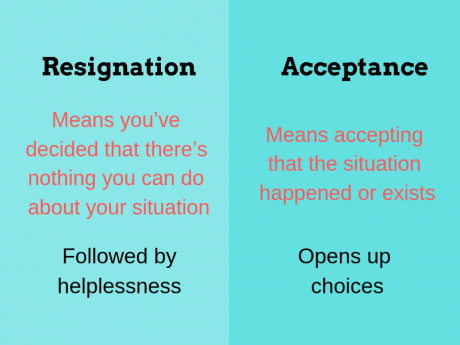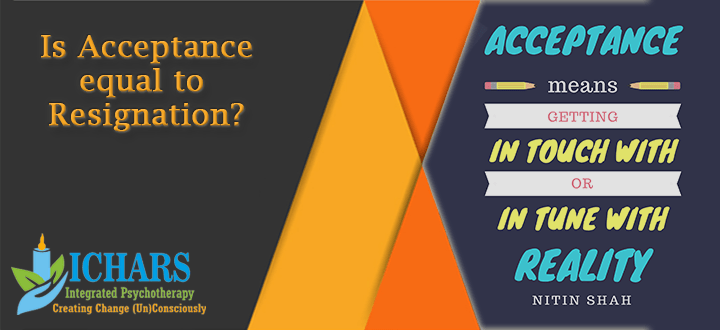“Acceptance” is one of those concepts that I understand yet have found difficult to define. I realised this while writing a post on anger, in which I explained how anger is generally a result of a lack of acceptance.
So, in this post, I will define “Acceptance” and how it could be useful in constructively channelling anger. I will also be addressing the many misconceptions that people have when it comes to defining and understanding “Acceptance”.
What are these misconceptions about acceptance?
During discussions when I asked people about their views on acceptance, the responses I received about this topic were more or less along the lines of the following-
- Wouldn’t acceptance make me dormant?
- Isn’t acceptance akin to resignation? Doesn’t that mean I’m just giving up?
Most people equate acceptance with an agreement, acquiescence, approval, and resignation, thinking that “if I accept things, then I’ll have to live with it” or “no change can take place once I accept something”.
But in reality, acceptance is generally the first step to any change.
What is Acceptance?
Acceptance means that we look into the face of the present and say, “I see you, and I acknowledge you are here.” It is getting in touch with or in tune with reality.
It also means realising that everything we think may not necessarily be true. Thus, acceptance requires us to differentiate between “what is” and “our assumptions” about the same.
What is Acceptance not?
Acceptance doesn’t necessarily mean that we agree with what is happening or that we believe it must continue. Also, it’s not the same as resignation or helplessness.
Difference between acceptance and resignation:

Resignation means giving up because you’ve decided that you can do nothing about your situation.
On the other hand, acceptance simply means accepting that the situation happened or that a situation still exists.
Resignation is followed by helplessness, whereas acceptance opens up choices.
Once you accept that a situation has happened, you can then choose to act accordingly.
What does Acceptance lead to?
Your actions could then help you to:
- Understand whether you would like the situation to change or to remain the same.
- Get a clearer understanding of the situation and the factors contributing to it.
- See the silver lining if you’re able to find one.
- Understand how you have contributed to making the situation as it currently is.
- Identify those steps that have not worked for you in this process of creating a change.
- Decide which other steps you can take to create the required change.
Acceptance: Case Study
In the first case study, we look at how acceptance can help people move on from a relationship that is not working for them.

One of my friends was going through relationship issues. She and her partner kept fighting about different things; she would complain about the fights yet insist that there was no problem regarding the relationship.
When she complained, people would suggest things that she could do to improve the situation. But she wouldn’t try those things or do something different to change the situation. When she finally accepted that something was going wrong with the relationship, then she began to pay more attention to:
- Her behaviour, i.e. trying to control every aspect of the relationship, and how it was contributing to making the situation worse. This helped her find ways to bring about a change in her behaviour.
- The fact that she wasn’t getting the most important thing for her from her relationship, i.e. Respect.
- Finding a way to talk to her partner so he would understand her expectations.
Once she spoke to her partner, he made it clear that he wouldn’t change anything about his behaviour, including how he treated her. Having this clarity and accepting that the partner is making this choice, made it relatively easier for her to move on and leave the relationship behind.
In the second case study, we look at how acceptance can help people make things work in a relationship
In another case, accepting the situation enabled the partners to sit and discuss the concerns more effectively and clearly with each other. This gave them the opportunity to create a plan of action to make the relationship work.
Below is a story that a friend narrated to me. I think this explains the importance of acceptance quite nicely.

“Sometime back, I had fallen into what I call a “lazy loop”. For almost a month, I simply sat and watched TV or played games on my phone. I knew I had things to complete and that I was simply wasting time. I wasn’t even doing the simplest tasks of dropping cheques to the bank or replying to the emails I had received. All along, I kept telling myself and my wife (who asked me about the same) that there was no problem, I just didn’t feel like doing anything, and I was not neglecting anything important.
She suggested I create a timetable or an elaborate to-do list to remind me of what I need to finish. She also asked me to maybe just go to the office instead of working from home.
My reply to her was that I had managed well without an elaborate to-do list all my life. More importantly, though I know I am wasting some time, there is nothing really wrong with me, so there is no need to put in all that effort.
So, I wasn’t willing to put in the necessary effort because, in my head, I had not yet accepted or acknowledged that there was a problem.”
Importance of Acceptance
Any change requires some amount of effort and discipline on our part. The mind doesn’t feel the need to put in that amount of work unless it realises the importance of change which in most cases requires the acceptance that there is a problem and that the change is necessary.
If you are a coach or a trainer who would like to develop coaching competencies that enable you to help your coachees or participants accept and create sustainable changes, you would love our Cognitive Hypnotic Coaching® Program.
And if you are a psychologist working with clients who have difficulty accepting life situations, you must search for the Cognitive Hypnotic Psychotherapy® Program. It is probably the most comprehensive therapeutic skill-building certification program in the world.

